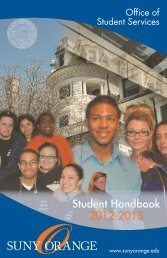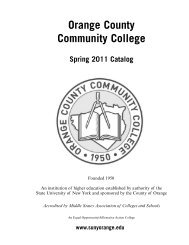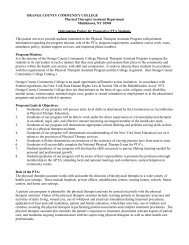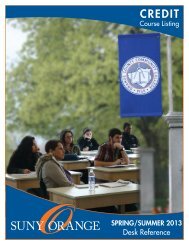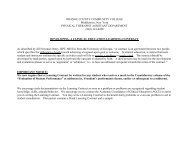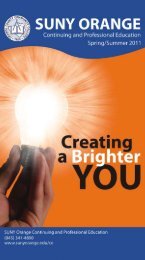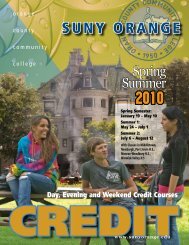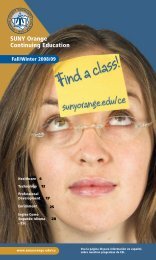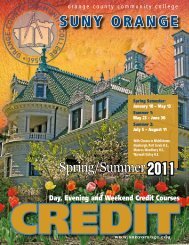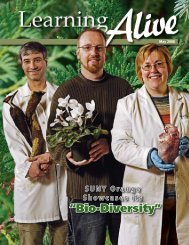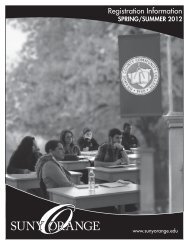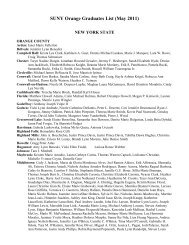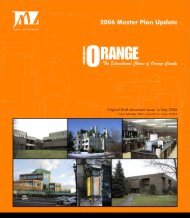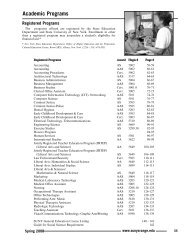Create successful ePaper yourself
Turn your PDF publications into a flip-book with our unique Google optimized e-Paper software.
Biology - Business<br />
BIO 202—Comparative Vertebrate Anatomy<br />
3 lect., 3 lab., 4 cr. (Spring)<br />
The morphology, physiology, evolutionary<br />
development, and adaptations of major organ<br />
systems in vertebrate animals are studied. Laboratory<br />
work includes histology and dissection of vertebrate<br />
animals.<br />
Prerequisite: one year of biological science. including<br />
BIO 101<br />
BIO 204—General Botany<br />
3 lect., 3 lab., 4 cr. (Spring)<br />
This is a general botany course that will study plant<br />
morphology and physiology of herbaceous and<br />
woody plant divisions within the plant kingdom as<br />
well as other related plant-like organisms. Topics<br />
covered include plant structure and function, plant<br />
growth, transpiration, photosynthesis, evolution, and<br />
reproductive cycles. The course concludes with the<br />
diversity of flowers and plant life. Laboratory work<br />
includes: microscopic examination of cells and tissues<br />
of typical plants, set up and monitoring of a<br />
hydroponics experiment that will utilize the scientific<br />
method and allow for continual plant growth<br />
observations. Students will also be assigned seeds<br />
from differing plant families to germinate and tend to<br />
until plant maturity. The course will also require a<br />
plant collection prepared by each student. (GE 2)<br />
Prerequisite: one year of biological science, including<br />
BIO 101<br />
BIO 205—General Ecology<br />
3 lect., 3 lab., 4 cr. (Fall)<br />
Ecology is the branch of science studying<br />
interactions and relationships between organisms and<br />
their environment. Topics include a study of individual,<br />
population, community and ecosystem ecology.<br />
Applications of ecology and the influence of humans<br />
on the biosphere will also be addressed. (GE 2)<br />
Prerequisite: one year of college-level biological<br />
science including BIO 101 or permision of the<br />
instructor<br />
BIO 210—Study of Biological Habitats<br />
2 lect., 2 lab., 3 cr.<br />
(Intersession-Spring Break/Summer)<br />
A 10 to 15 day field experience in a marine, fresh<br />
water or terrestrial habitat at an off campus location.<br />
The ecological interactions of flora and fauna, with<br />
their habitats, are examined in detail. The Catskills,<br />
Maine, the Southwest Desert Biome, and Tropics are<br />
among the habitats studied. Fee charged for<br />
transportation and living expenses. (GE 2)<br />
Prerequisite: One year of college biological science<br />
or permission of the instructor<br />
Business<br />
(Business Department)<br />
BUS 101—Business Mathematics<br />
3 cr. (Fall/Spring)<br />
This course is required by various A.A.S. degrees in<br />
business and can be used as an elective in others. This<br />
course will emphasize the use of business terminology<br />
and the solving of business problems using decimals<br />
and percentages. Topics that are covered in this<br />
course include, but are not limited to, the following:<br />
gross and net payroll calculations; markup and<br />
markdown; trade discounts and cash discounts;<br />
simple interest, compound interest, and ordinary<br />
annuities.<br />
Note: This course cannot be used to fulfill the<br />
Math/Science requirement for any degree.<br />
Prerequisite: MAT 020 and RDG 080<br />
BUS 103—Introduction to Business<br />
3 cr. (Fall/Spring)<br />
In this analysis of current business practices, the<br />
following topics are examined: impact of technology<br />
on businesses, economic systems, forms of ownership,<br />
social responsibility, management and organization,<br />
finance, marketing, human resources, information<br />
management and international business. Topical<br />
issues and cases are used to reinforce terminology and<br />
concepts. It is strongly advised that students take this<br />
course in their first semester.<br />
BUS 105—Business and Society<br />
3 cr. (Fall/Spring)<br />
Emphasis is placed on current business economic<br />
policy issues as applied to the roles of government<br />
and the consumer. The course is structured to help<br />
both enlighten and sharpen the student's awareness of<br />
current economic problems and business issues in<br />
today's dynamic environment. Major emphasis is<br />
placed on inflation, unemployment, social security,<br />
health care, deficits, debt, global trade, and monetary<br />
and fiscal policy.<br />
BUS 111—E-Business Principles<br />
3 cr. (Fall/Spring)<br />
Electronic business provides a foundation for<br />
conducting business on the Internet worldwide.<br />
Electronic business involves the use of Internet<br />
technology to transform key business processes in<br />
order to maximize customer value and facilitate the<br />
exchange of goods and services between buyers and<br />
sellers. Topics include: business to business (B2B) and<br />
business to customer (B2C) electronic commerce;<br />
advertising, market research, privacy and security<br />
issues on the Internet. Emphasis is placed on realworld<br />
application and Internet exercises. Each student<br />
will complete an Internet project.<br />
176 www.sunyorange.edu Spring 2012



